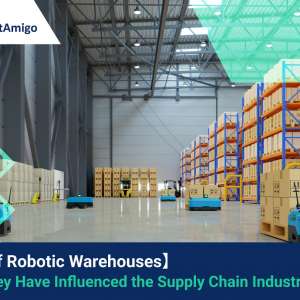Author Name: Tiffany Lee – Marketing Analyst at FreightAmigo
The logistics industry plays a critical role in the global economy by ensuring the efficient movement of goods from manufacturers to consumers. However, traditional supply chain processes often suffer from inefficiencies, lack of transparency, and high costs. In recent years, blockchain technology has emerged as a game-changer for the logistics industry, with its ability to streamline operations, enhance security, and improve trust among participants. One of the key applications of blockchain in logistics is the use of smart contracts, which automate and secure various processes within the supply chain.
Want To Compare The Best Express, Air Freight, Sea Freight, Rail Freight & Trucking Rates So As To Have Better Control On Cost?
Understanding Smart Contracts in the Logistics Industry
A smart contract is a self-executing contract with the terms of the agreement directly written into code. It resides on a blockchain network, which ensures transparency, immutability, and decentralization. Smart contracts eliminate the need for intermediaries and enable the automation of contract execution, making supply chain processes more efficient and cost-effective.
In the logistics industry, smart contracts have the potential to revolutionize various aspects of operations, including documentation, payments, traceability, and compliance. By leveraging blockchain technology, smart contracts can simplify and secure processes such as agreement terms, fraud protection, record-keeping, payments, and cash flow management. Furthermore, they eliminate the need for third-party processors, reducing costs and enhancing trust among participants.
Documenting Shipment Data with Smart Contracts
One of the most exciting applications of smart contracts in the logistics industry is the documentation of shipment data. Blockchain-based platforms like ShipChain are leveraging smart contracts to track shipments from the factory to the customer’s doorstep. By recording every step of the journey on the blockchain, smart contracts are automatically triggered once the predefined terms are fulfilled. This not only ensures transparency and accountability but also enables real-time visibility of the entire supply chain process.
Digitizing Letters of Credit for International Trade
International trade often involves complex financial transactions and the need for trust between importers and exporters. Traditionally, letters of credit (L/C) have been used to guarantee payment between parties. However, the manual processing of L/Cs can be time-consuming and prone to errors. Smart contracts offer a solution by digitizing the process of issuing and executing letters of credit. Banks like BofA Securities and HSBC are leading the way in automating trade deals using smart contracts, enabling faster and more secure transactions.
Upholding Sustainable Practices in the Tuna Industry
Sustainability and traceability are critical concerns in the seafood industry, particularly for products like tuna. Blockchain-based supply chain companies like Treum are leveraging smart contracts to ensure sustainable fishing practices. By attaching RFID tags to tuna fish as soon as they are caught, the geolocation data is recorded on the Ethereum blockchain. This verifies that the fish was legally and sustainably caught, providing consumers with transparency and confidence in their purchasing decisions.
Ensuring Pharmaceutical Tracking and Traceability
The pharmaceutical industry faces strict regulations to ensure the safety and authenticity of medications. Smart contracts are playing a crucial role in enabling unit-level tracking and traceability of pharmaceutical products. For example, GlaxoSmithKline is partnering with Ethereum-based supply chain platform Viant to implement a blockchain-based supply system. This ensures quality control and prevents counterfeit products from entering the market. Smart contracts streamline the compliance process, reducing the risk of non-compliance while enhancing transparency for regulators and consumers.
Driving Adoption with Blockchain in Transport Alliance (BiTA)
To drive the adoption of blockchain and smart contract technology in the freight marketplace, organizations like the Blockchain in Transport Alliance (BiTA) are playing a significant role. BiTA provides education and an open forum for industry professionals interested in pursuing blockchain solutions. With over 500 members across 25 countries, BiTA is fostering collaboration and knowledge-sharing to accelerate the integration of blockchain technology in the transport and logistics industry.
Benefits and Challenges of Smart Contracts in Logistics
The adoption of smart contracts in the logistics industry offers several benefits, including increased efficiency, cost reduction, transparency, and improved security. By automating contract execution and eliminating the need for intermediaries, smart contracts streamline processes, reduce errors, and enhance trust among participants. Furthermore, the combination of smart contracts with technologies like the Internet of Things (IoT) and distributed ledger technology (DLT) enables real-time data tracking, enhancing supply chain visibility and responsiveness.
However, there are also challenges associated with the implementation of smart contracts in logistics. Amendments to executed smart contracts can be complex, often requiring the creation of entirely new contracts. Additionally, contract termination and rescission can be cumbersome, as the old contracts remain on the blockchain. The creation of smart contracts also requires collaboration between legal and technical experts, making the process more intricate.
The Future of Smart Contracts in Logistics
The widespread adoption of blockchain and smart contracts in the logistics industry is still in its early stages. However, the potential for transformation is significant. As more companies recognize the benefits of blockchain and smart contracts, we can expect increased collaboration, standardization, and regulatory frameworks to support their implementation. The integration of emerging technologies like IoT, RFID, and mobile technology will further enhance the capabilities of smart contracts, enabling end-to-end traceability, real-time data exchange, and improved customer experience.
In conclusion, blockchain technology and smart contracts have the potential to revolutionize the logistics industry by streamlining operations, enhancing security, and improving trust among participants. From documenting shipment data to digitizing letters of credit and upholding sustainable practices, smart contracts offer a wide range of applications in logistics. While there are challenges to overcome, the benefits of smart contracts, including increased efficiency, cost reduction, and transparency, make them a promising solution for the future of logistics. As the industry continues to embrace blockchain and smart contract technology, we can expect to see a more efficient, secure, and customer-centric supply chain ecosystem.
There Are Different Options For Cargo Transportation. If You Want To Choose The Most Convenient And Suitable Solution, It Is Best To Have The Full Support Of Logistics Experts! If You Are Planning To Ship Goods Overseas, Please Go To The FreightAmigo Page For Inquiries.
===
Read More:
【Export of USA】 A Gateway to Success and Global Economic Influence
The Key Trade Partners of the USA: Boosting International Commerce
【Export of USA】 US-China Trade War’s Influence on USA’s Export Industry
===
If you have any inquiries on logistics/supply chain, feel free to contact FreightAmigo now:
Chat with us online OR
Phone : +852 28121686
WhatsApp: +852 27467829









































